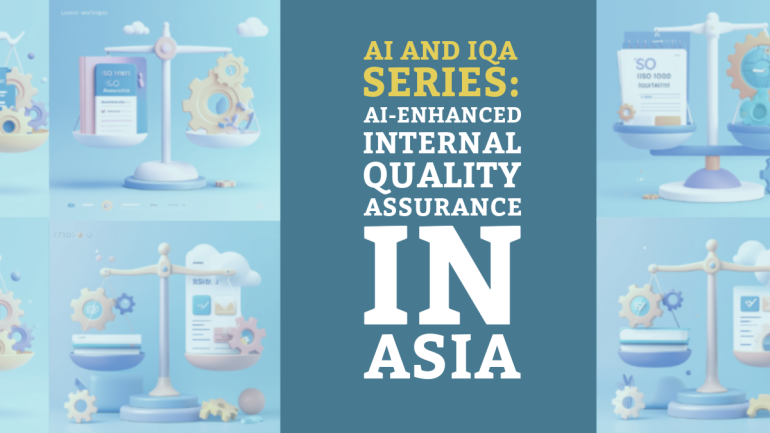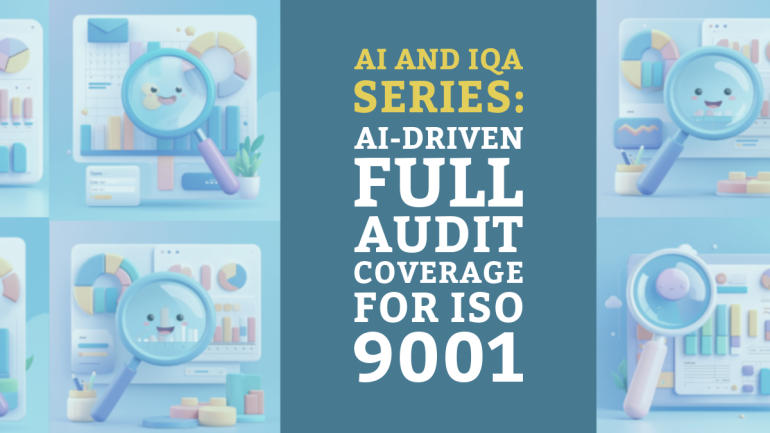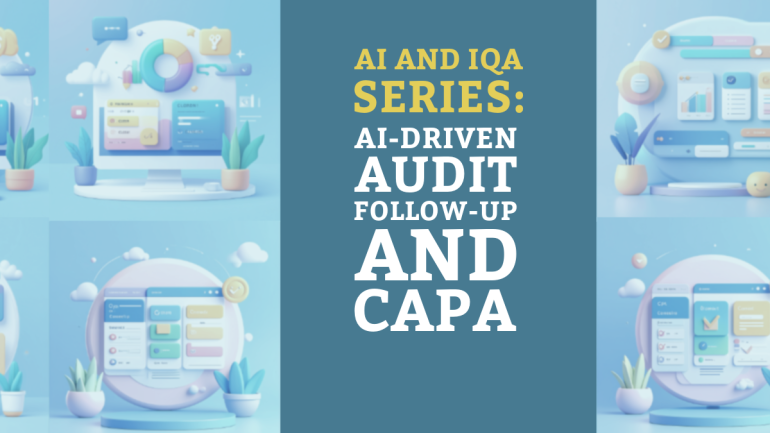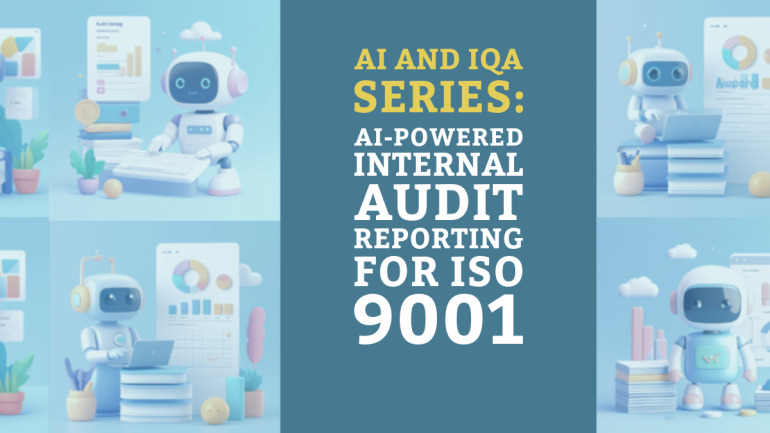Table of Contents
TL;DR: How AI Enhances IQA Aligned with ISO 9001 & ISO 19011 in Asia
- AI addresses internal quality assurance (IQA) challenges by automating routine audit tasks, significantly reducing audit fatigue, and enabling continuous, real-time quality monitoring aligned with ISO 9001 and ISO 19011 standards.
- Asian countries like Singapore, Japan, South Korea, and Malaysia are leading the integration of AI into IQA through government-backed initiatives, robust regulatory frameworks, and successful real-world corporate applications.
- Real-world results from 2023–2024 show that AI-driven IQA leads to tangible improvements such as a 51% reduction in production downtime (Agilent Singapore) and increased audit efficiency, including faster anomaly detection and corrective action.
- Standards bodies like ISO are adapting frameworks (e.g., upcoming ISO 9001:2026 and ISO/IEC 42001:2023) to explicitly support AI integration, ensuring technology-driven IQA remains compliant, reliable, and aligned with traditional quality management principles.
Internal Quality Assurance (IQA) is entering a new era as artificial intelligence (AI) transforms how organizations maintain quality and conduct audits. ISO 9001 (Quality Management Systems) and ISO 19011 (auditing guidelines) provide frameworks for consistent quality and effective internal audits. Today, AI tools—ranging from machine learning to natural language processing—are being leveraged to augment these frameworks, enabling more data-driven, efficient, and continuous quality assurance. This trend, often termed Quality 4.0, aligns advanced technologies with ISO’s principles of continual improvement and evidence-based decision making. In practice, many Asian organizations are early adopters, integrating AI into IQA processes to meet and exceed ISO 9001 requirements while adhering to ISO 19011 audit guidelines.
Aligning AI with ISO 9001 & ISO 19011 Frameworks
AI’s capabilities map closely to the core objectives of ISO 9001:2015—which emphasizes risk-based thinking, process control, and continuous improvement—and ISO 19011:2018, which guides efficient, objective auditing. For example, AI-driven analytics can monitor process data in real time, flag anomalies and non-conformities faster than traditional manual checks. This supports ISO 9001’s requirement for monitoring and measurement, leading to proactive corrections and quality improvements.
On the audit side, AI tools help internal auditors analyze large datasets of transactions or records, aligning with ISO 19011’s guidance on using evidence-based techniques. Auditors can employ machine learning to identify high-risk areas (e.g., through pattern detection), allowing risk-based internal audits that focus on critical issues. In practice, AI is enabling a shift toward continuous auditing: instead of periodic checks, organizations can continually assess compliance and process performance using AI dashboards. This not only maintains adherence to standards but enhances it, as audits become more thorough and frequent without proportional increases in auditor workload.
Standards Evolution
Recognizing these benefits, standards bodies are updating frameworks to explicitly incorporate digital technologies. The next revision of ISO 9001 (due ~2026) is expected to tackle Industry 4.0 head-on by providing guidance on integrating AI and other technologies into quality management systems. In parallel, a new standard ISO/IEC 42001:2023 was introduced to govern AI Management Systems— and countries like Singapore swiftly adopted it as a national standard. Singapore even launched an accredited certification program under ISO 42001, with Changi Airport Group becoming the first organization certified for its AI systems. These developments show a clear alignment: AI deployments are being guided into a structured, audited approach, ensuring they bolster quality and compliance rather than undermine it. In short, AI is viewed as a powerful tool to enhance QMS and audits – one that must be managed with the same rigor as other quality processes.
Asia Pacific Leading Adoption of AI in QA
Asia-Pacific organizations are at the forefront of adopting AI for quality assurance and internal audits. Studies show that globally over half of organizations use AI in some form, yet only about 18% of internal audit functions have begun leveraging AI tools. Notably, the Asia-Pacific region leads in this area – businesses in APAC report more advanced AI use and greater value derived compared to those in North America or Europe. Singapore, in particular, stands out with the highest AI readiness in both business and government (scoring 70.1 on a regional index). This strong readiness is backed by government support and digital infrastructure, enabling firms to integrate AI into their QA processes quickly.
Asian governments and industry bodies have launched initiatives to drive AI adoption in line with quality frameworks. For example, the South Korean government’s ₩10 trillion (≈US$7.5 billion) support package for “AI Autonomous Manufacturing” and Malaysia’s climb to 23rd in the Government AI Readiness Index. Across Asia, there is recognition that AI can strengthen quality and safety: regulators are issuing guidelines on responsible AI (such as Singapore’s health authorities stressing data quality and explainability in medical AI systems), ensuring AI augments audits and quality control while remaining aligned with ISO principles and ethical standards.
Singapore: Pioneering AI-Driven Quality Assurance
Singapore has emerged as a regional leader in deploying AI for internal quality assurance and audits. The nation’s Smart Nation initiatives and pro-innovation regulations have created a conducive environment for AI in corporate governance and quality management.
- Standards and Governance: Singapore became one of the first countries to adopt ISO/IEC 42001 (AI Management Systems) as a national standard, launching an accredited certification program in 2023. Changi Airport Group was the first to be certified under this AI governance standard. This move aligns AI deployment with robust QA practices—ensuring AI systems themselves meet quality, safety, and reliability benchmarks.
- Manufacturing Quality Case Study: Agilent Technologies in Singapore implemented AI-driven solutions in production testing and quality control, shortening test cycles and reducing downtime by 51%. AI algorithms now identify root causes faster and more accurately, reducing waste by 53% and improving productivity by 31%.
- Internal Audit and Finance: Singapore’s financial and public sectors are piloting generative AI (e.g., ChatGPT) for audit planning, data analysis, and report drafting. According to the Institute of Internal Auditors Singapore, AI can handle routine audit queries and documentation, freeing auditors to focus on judgment-intensive tasks and cutting down manual audit work significantly.
Japan: Integrating AI with a Tradition of Quality
Japan, renowned for Kaizen and Total Quality Management, is now blending those strengths with AI innovations to enhance internal QA and audits.
- Smart Manufacturing and Robotics: Accounting for ~45% of the world’s industrial robots, companies like Fanuc embed AI in their robots to “learn” and improve performance. Toyota uses AI-powered visual inspection systems for vehicle components, automatically identifying flaws that human inspectors might miss.
- Quality Improvement and Maintenance: Hitachi and Mitsubishi Electric use AI analytics to predict equipment failures and defects based on sensor data, preventing breakdowns and reducing variability—perfectly illustrating ISO 9001’s risk-based thinking.
- Governance and Audit: Through policies like the Hiroshima AI Process (G7, 2023), Japan emphasizes trustworthy AI. Major electronics firms audit AI algorithms and data quality as part of ISO 9001 compliance, ensuring AI itself doesn’t become a QA blind spot.
South Korea: Smart Factories and AI-Backed Audits
South Korea’s government and industry are leading AI adoption in manufacturing and audits.
- Government Initiatives: The ₩10 trillion “AI Autonomous Manufacturing” package and the Framework Act on AI (2024) incentivize responsible AI adoption and quality improvements aligned with ISO 9001 goals.
- Manufacturing Quality Case: Hyundai Mobis uses an Acoustic AI inspection system to analyze sounds from electric power steering units at one unit per second—far faster than human inspection—ensuring each unit meets strict safety and quality criteria.
- Electronics and Other Sectors: Samsung and LG employ AI vision models in semiconductor fabs to detect microscopic defects, and internal audits now include AI model performance reviews to maintain ultra-high quality standards.
Malaysia: Building Quality 4.0 Foundations
Malaysia lays strong foundations for AI-enhanced QA through national strategies and pilots.
- National Strategy and Readiness: Climbing to 23rd in the Government AI Readiness Index, Malaysia’s National AI Roadmap and Industry4WRD policy provide grants and guidance for AI in manufacturing and services.
- Manufacturing and Services Examples: Electronics factories in Penang use AI vision for circuit board inspection, boosting defect detection from ~70% to ~90%. Malaysian banks use AI for transaction anomaly detection as part of ISO 9001-aligned risk controls.
- Healthcare and Education: Kuala Lumpur hospitals pilot AI for lab result validation, reducing errors and speeding up QA. ASEAN universities explore AI to analyze student performance data for internal program audits under ISO-aligned frameworks.
Sector-Specific Applications and Case Studies
- Manufacturing: AI-powered vision inspection (Agilent, Toyota, Hyundai Mobis) leads to fewer defects, less downtime, and more efficient audits—all reinforcing QMS objectives.
- Finance: Banks like DBS and MUFG pilot AI for real-time anomaly detection in trading and claims audits, reducing manual compliance hours by ~30% and increasing issue detection.
- Healthcare: Hospitals automate accreditation data checks and monitor compliance (e.g., hand hygiene) with AI, accelerating audit cycles and improving patient safety under ISO 15189 and ISO 9001.
- Education: ASEAN QA bodies and universities explore AI for continuous monitoring of student outcomes and admin processes, aiming for ISO 21001-aligned internal reviews and more efficient accreditation.
Conclusion and Outlook
Real-world examples from 2023–2024 show AI dramatically enhances IQA when aligned with established standards. Asian organizations report reduced defect rates, faster audit cycles, cost savings, and better compliance—all verifiable by data. The key to success has been integrating AI thoughtfully: auditors verify AI findings, quality managers retrain models, and staff upskill to work alongside AI. This mirrors ISO 9001’s control of resources and ISO 19011’s emphasis on competent auditors in the AI era.
Looking ahead, standards bodies will embed AI guidance in ISO 9001:2026 revisions, further encouraging global adoption. Asia’s government-backed AI programs and enterprise-wide QA systems—like lights-out inspection lines and continuous transaction monitoring—will set the benchmark. AI, anchored in a strong quality framework, is not just enhancing IQA—it is revolutionizing it.
FAQs on AI Integration in IQA
- How does AI specifically improve compliance with ISO 9001 and ISO 19011 guidelines?
AI automates data analysis, identifies risks and non-conformities rapidly, and enables continuous monitoring, aligning with ISO 9001’s continuous improvement and ISO 19011’s evidence-based auditing. - What are the key risks organizations face when integrating AI into their IQA processes?
Key risks include algorithmic bias, data privacy concerns, and over-reliance on automation—highlighting the necessity for ongoing human oversight and robust AI governance. - How are Asian governments supporting AI adoption in quality assurance?
Governments like Singapore and South Korea provide regulatory support, financial incentives, dedicated AI frameworks, and certification programs (e.g., ISO/IEC 42001) to promote responsible AI integration in QA. - Can SMEs also benefit from AI-driven IQA?
Yes. SMEs gain from reduced audit workloads, faster issue identification, and cost-effective quality improvements—often supported by government incentives and scalable cloud-based AI solutions. - What skills will auditors and quality managers need as AI becomes integral to IQA?
They will need digital literacy, analytical skills to interpret AI insights, and the ability to manage AI systems effectively, ensuring AI complements human judgment.





